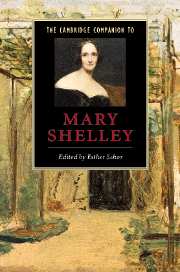Book contents
7 - The Last Man
from Part 2 - Fictions and myths
Published online by Cambridge University Press: 28 May 2006
Summary
When Mary Shelley's The Last Man was published in 1826, her Lionel Verney entered a literary scene already peopled by a significant number of last men, such that reviewers could not resist jokes at the expense of this crowd of solitary survivors. Cousin de Grainville's prose epic Le Dernier Homme, posthumously published in 1805, had initiated this post-revolutionary mode. An anonymous English translation entitled The Last Man, or, Omegarus and Syderia, a Romance of Futurity appeared in 1806. Byron's poem “Darkness,” one of his best-known works among his contemporaries, was written in 1816 at Lake Geneva, where Shelley also began Frankenstein. And the most popular variation on this theme, Thomas Campbell's lyric “The Last Man,” appeared in 1823 and was followed, in the next decades, by a wealth of imitations and parodies as well as by John Martin's remarkable, apocalyptic paintings of the subject from 1826, 1833, and 1850.
Shelley thus joins her contemporaries in her apocalyptic response to the horrors of the French Revolution, the subsequent carnage of the Napoleonic wars, and the metaphysical and cultural uncertainties attendant upon Romantic-era attacks on religious and political authority. Yet the extremity of her particular form of apocalypse bears comparison with twentieth-century existentialist, absurdist, and nihilist reactions to two World Wars, the Holocaust, and the atomic bomb, such as Camus’s La Peste or Ionesco’s Les Chaises, thus revealing The Last Man, like Frankenstein, as an uncannily prescient novel. In its refusal to place humanity at the center of the universe, its questioning of our privileged position in relation to nature, then, The Last Man constitutes a profound and prophetic challenge to Western humanism.
- Type
- Chapter
- Information
- The Cambridge Companion to Mary Shelley , pp. 116 - 134Publisher: Cambridge University PressPrint publication year: 2003
- 5
- Cited by



